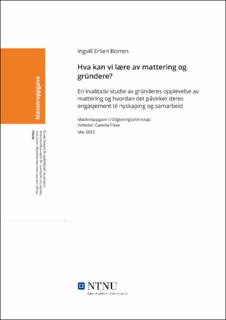| dc.contributor.advisor | Fikse, Camilla | |
| dc.contributor.author | Borren, Ingvill Erlien | |
| dc.date.accessioned | 2022-07-09T17:23:30Z | |
| dc.date.available | 2022-07-09T17:23:30Z | |
| dc.date.issued | 2022 | |
| dc.identifier | no.ntnu:inspera:110182261:16227413 | |
| dc.identifier.uri | https://hdl.handle.net/11250/3004435 | |
| dc.description.abstract | Vi lever i en kompleks verden, noe den siste tiden har minnet oss om med både pandemi og krig på det europeiske kontinentet. Hverdagslivet preges i tillegg av kampen mot klimaendringene og FNs bærekraftsmål som er verdens felles arbeidsplan for å utrydde fattigdom, bekjempe ulikhet og stoppe klimaendringene innen 2030. Nyskaping og samarbeid er helt avgjørende for å nå bærekraftsmålene og sier noe om kompleksiteten og omfanget av de 17 målene. Nyskaping og samarbeid har både lokal, nasjonal og internasjonal verdi og betydning for utvikling og fremskritt mot å skape en mer bærekraftig verden på individ-, gruppe- og samfunnsnivå. Dette er en tematikk som engasjerer meg og som derfor har blitt utgangspunkt for denne studien.
Gjennom en kvalitativ intervjustudie har jeg undersøkt følgende problemstilling: «Hvordan kan mattering påvirke gründeres engasjement til nyskaping og samarbeid?». Mattering, på norsk oversatt til betydningsfullhet, handler om å bidra med noe verdifullt og føle seg verdifull. Utvalget bestod av fem deltakere som jobber eller har jobbet som gründere i ulike typer bransjer. Bruk av stegvis-deduktiv induktiv metode for analyse av det innsamlede datamaterialet resulterte i temaene (1) «Å være sin egen sjef», (2) «Å bidra til at andre kanskje får et bedre liv» og (3) «Samarbeid som grunnlag for utvikling».
Med teori om mattering, selvledelse, livskvalitet, nyskaping og samarbeid diskuterer jeg studiens funn. Jeg drøfter hvordan deltakerne i studien beskrev at de som gründere balanserer å tilføre verdi til seg selv og til andre. Videre diskuterer jeg hvordan mattering påvirker gründeres engasjement til nyskaping og samarbeid i lys av både personlig mening og sosial harmoni. Studiens funn viser at å oppleve seg betydningsfull (mattering) påvirker gründeres engasjement til nyskaping og samarbeid. Basert på funnene argumenterer jeg for at studiens funn kan ha implikasjoner også utover å drive gründervirksomhet. | |
| dc.description.abstract | We live in a complex world. That, the pandemic and the Russian invasion of Ukraine has recently reminded us of. Daily life is characterized by the fight against climate change and the UN’s sustainability goals, which is the joint work plan to eradicate poverty, fight inequality and stop climate change by 2030. Innovation and cooperation are crucial to achieve the sustainability goals, which indicate the complexity and scope of the 17 goals. Innovation and cooperation have local, national and international value and significance for development and progress toward creating a more sustainable world for individuals, groups and societies. This study was created as a result of my interest and engagement in this topic.
Through a qualitative approach, the master thesis examines the following question: “How can mattering affect entrepreneurs’ engagement to innovation and collaboration?”. Mattering is an ideal state of affairs consisting of adding value and feeling valued. The sample consisted of five participants who work or has worked as entrepreneurs in various types of industries. I conducted a step-by-step inductive (SDI) method to analyze the collected data material, which resulted in the following themes: (1) “Being one’s own boss”, (2) “To contribute to others so they may have a better life”, (3) “Cooperation as a basis for development”.
The results are reviewed in light of theories about mattering, self-management, innovation, well-being and cooperation. I discuss how the participants in this study described that they as entrepreneurs balance adding value to themselves and others. Furthermore, I discuss how mattering affects entrepreneurs’ engagement to innovation and collaboration in the light of both personal meaning and social harmony. The study’s findings show that mattering affects entrepreneurs’ engagement to innovation and collaboration. Based on the findings, I argue that these findings also have implications beyond running an entrepreneurial business. | |
| dc.language | nob | |
| dc.publisher | NTNU | |
| dc.title | Hva kan vi lære av mattering og gründere? | |
| dc.type | Master thesis | |
